Unit1-unit4复习
译林小学英语六A Unit1-4复习课教案
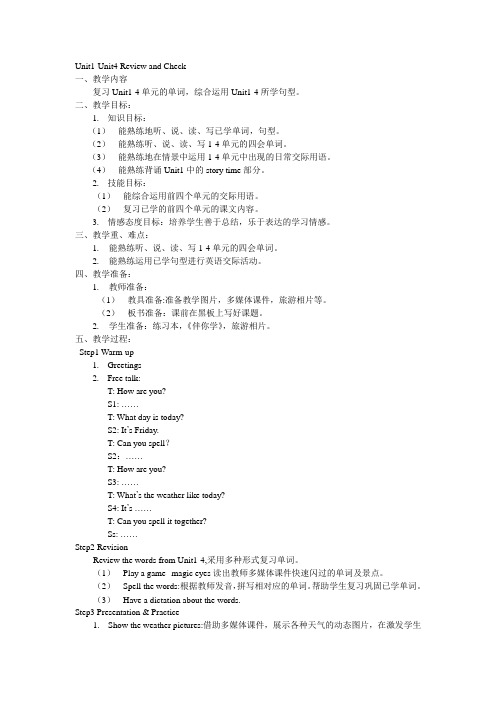
Unit1-Unit4 Review and Check一、教学内容复习Unit1-4单元的单词,综合运用Unit1-4所学句型。
二、教学目标:1.知识目标:(1)能熟练地听、说、读、写已学单词,句型。
(2)能熟练听、说、读、写1-4单元的四会单词。
(3)能熟练地在情景中运用1-4单元中出现的日常交际用语。
(4)能熟练背诵Unit1中的story time部分。
2.技能目标:(1)能综合运用前四个单元的交际用语。
(2)复习已学的前四个单元的课文内容。
3.情感态度目标:培养学生善于总结,乐于表达的学习情感。
三、教学重、难点:1.能熟练听、说、读、写1-4单元的四会单词。
2.能熟练运用已学句型进行英语交际活动。
四、教学准备:1.教师准备:(1)教具准备:准备教学图片,多媒体课件,旅游相片等。
(2)板书准备:课前在黑板上写好课题。
2.学生准备:练习本,《伴你学》,旅游相片。
五、教学过程:Step1 Warm-up1.Greetings2.Free talk:T: How are you?S1: ……T: What day is today?S2: It’s Friday.T: Can you spell?S2:……T: How are you?S3: ……T: What’s the weather like today?S4: It’s ……T: Can you spell it together?Ss: ……Step2 RevisionReview the words from Unit1-4,采用多种形式复习单词。
(1)Play a game--magic eyes读出教师多媒体课件快速闪过的单词及景点。
(2)Spell the words:根据教师发音,拼写相对应的单词。
帮助学生复习巩固已学单词。
(3)Have a dictation about the words.Step3 Presentation & Practice1.Show the weather pictures:借助多媒体课件,展示各种天气的动态图片,在激发学生兴趣的同时,和学生一起拼读单词,帮助学生更好的复习巩固天气类单词。
人教版七年级1_1_Unit4复习重点知识点
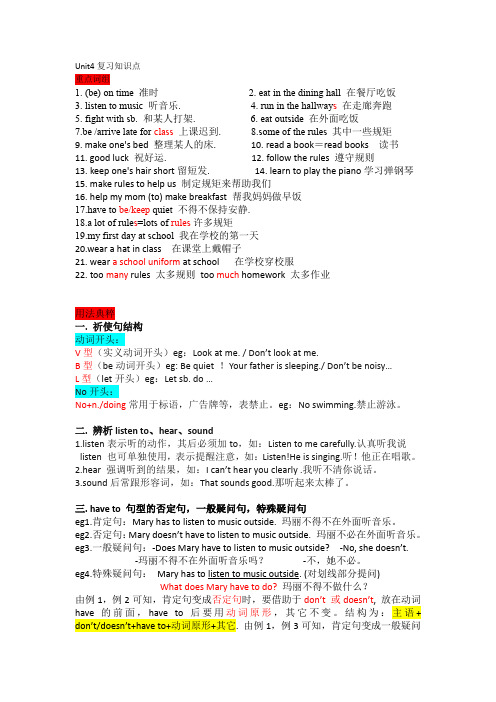
Unit4复习知识点重点词组1. (be) on time 准时2. eat in the dining hall 在餐厅吃饭3. listen to music 听音乐.4. run in the hallway s在走廊奔跑5. fight with sb. 和某人打架.6. eat outside 在外面吃饭7.be /arrive late for class上课迟到. 8.some of the rules 其中一些规矩9. make one's bed 整理某人的床. 10. read a book=read books 读书11. good luck 祝好运. 12. follow the rules 遵守规则13. keep one's hair short留短发. 14. learn to play the piano学习弹钢琴15. make rules to help us 制定规矩来帮助我们16. help my mom (to) make breakfast 帮我妈妈做早饭17.have to be/keep quiet 不得不保持安静.18.a lot of rule s=lots of rules许多规矩19.my first day at school 我在学校的第一天20.wear a hat in class 在课堂上戴帽子21. wear a school uniform at school 在学校穿校服22. too many rules 太多规则too much homework 太多作业用法典粹一. 祈使句结构动词开头:V型(实义动词开头)eg:Look at me. / Don’t look at me.B型(be动词开头)eg: Be quiet !Your father is sleeping./ Don’t be noisy…L型(let开头)eg:Let sb. do …No开头:No+n./doing常用于标语,广告牌等,表禁止。
九年级英语1-4单元复习要点
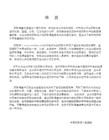
29.spend time doing 花时间做… 30.take sb. to concerts 带某人去音乐会
31.daily life 日常生活 32.afford to do 负担得起
Unit 1 复习要点
一、短语。
1. by making flashcards 通过做单词抽认卡 2. ask…for help 向某人求助
3. read aloud 朗读 4. that way (=in that way) 通过那种方式
5. improve my speaking skills 提高我的会话技巧
45. in the last few years 在过去的几年里 46.send messages 发信息
47.be able to 能够 48.be made up of … 由……组成的
49.sound like … 听起来像 50.instead of … 代替……
二、句型。
1.I used to be afraid of the dark. 我以前害怕黑暗.
2.I go to sleep with my bedroom light on. 我开着卧室的灯睡觉.
3.I used to spend a lot of time playing games with my friends.
11.do a survey about… 做有关…的调查 12.keep an English notebook 记英语笔记
13.spoken English (= oral English) 英语口语 14.make mistakes in sth 在… 犯错误
Starter_Unit1-Unit4_知识点总结

Starter Unit1-Unit4 知识点总结1.问候用语Good morning/afternoon/evening!早上好/下午好/晚上好!Good night!晚安!(晚上告别语)—How are you? 你(身体)好吗?—I’m fine/very well/ OK, thanks. How are you? / And you? 我很好,谢谢。
你呢?—I’m fine/OK, too. 我也很好。
注意:若问家人身体怎么样:How +be+家人?2.询问某物用英语怎么说—What’s this/that in English?—It’s a/an…+单数物品. (不用this/that回答,用人称代词it回答。
)be 动词作谓语动词的特殊疑问句:特殊疑问词+be动词(注意人称单复数)+主语+句子其余部分? 具体回答(人称代词):主语+be+句子其余部分.名词单数不要忘记a/anbe动词用法口诀我用am,你用are,is连着他/她/它,单数名词用is,复数名词全用are,1 / 5变否定,更容易,(be)后加not就可以,变问句,往前提,句末问号莫忘记。
指示代词:this/ that/these/thosethis:近指,作主语,谓语动词用单数形式。
that:远指,作主语,谓语动词用单数形式。
these:近指,作主语,谓语动词用复数形式。
those:远指,作主语,谓语动词用复数形式。
冠词a/an/thea和an是不定冠词,只用在可数名词单数前面,表示“一”。
a用在以辅音音素开头的单词前;an 用在以元音音素开头的单词前。
如:a pen /pen/ 一支钢笔(/p/为辅音音素)an orange /'ɔrɪndʒ/ 一个桔子(/ɒ /为元音音素)the是定冠词,表示“这(个),那(个),这些,那些”,在元音音素前读/ði:/,在辅音音素前读/ðə/。
它可以用在名词前,表示特指说话双方都知道的人或物,或上文提到的人或物。
四年级英语上册unit1-unit4单词复习(陕西旅游版)优秀版
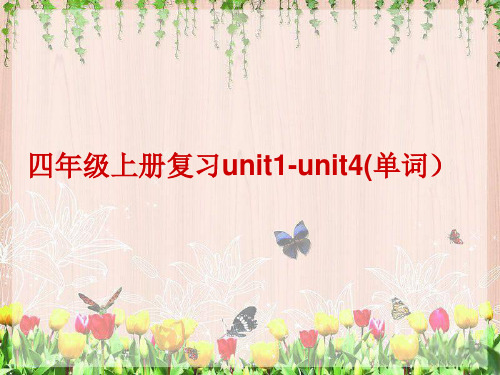
热身:
• 全班一起做热身操。
nurse
cook
farmer
doctor
worker
driver
policeman
policewoman
游戏操练单词:
• 老师做动作让学生猜是什么职业。 • 编儿歌操练单词: 医生,医生,doctor, doctor ,doctor 把病瞧。 护士,护士,nurse, nurse ,nurse药拿到。 农民,农民,farmer, farmer, farmer起得早。 辛勤耕耘收成好。 司机,司机,driver, driver, driver开车引路滴滴跑。 工人,工人,worker, worker, worker把国造。 警察,警察,policeman, policeman, policeman真英勇。 厨师,厨师,cook, cook了不起。 香喷喷的饭菜惹人爱。
洁心与大熊在进入高中的第一天相识,两人都是大个子,分座位的时候,老师让男女生各排一队,一队一个次第走到座位上,最后一排有六张桌子,洁心谦虚地站到一个比自己矮一点 点的女生前面,与大熊成了同桌
他们一个15岁,一个16岁,花开的季节。初学立体几何,大熊用小纸壳手工助洁心理解立体与平面的迥异,地理考试这对同桌囊括了班里两个第一,大熊94分,第一名,洁心47分, 倒数第一。大熊不知怎么就让无论如何都搞不懂季风洋流方向的洁心尤如神助,醍醐灌顶。洁心盼着上作文课,老师会朗读几篇上榜佳作,每每读到洁心的作文,大熊会看洁心一眼, 好像在说我知道这一篇是你写的,洁心也会漫不经心瞥一眼,故作平淡地回复嗯,是我。不知从何时起,他们走进彼此的心。大学毕业的第二年,他们结了婚,第三年,有了一个可爱 的孩子。洁心的日常开始以大熊小熊为中心,辞去优渥工作,成为家庭主妇,曾经的诗情画意干练要强变成琐碎的柴米油盐酱醋茶,窈窕淑女变成自带三层救生圈的黄脸婆,大熊成为 业内认可的职业经理人,小熊也取得全国乃至世界各大数学竞赛计算机竞赛的各色奖牌。被大熊小熊的光环映着,洁心日复一日忙忙活活庸庸碌碌地快乐着。人和人之间的比较,是丢 失快乐最简单的方式。昔日的同学大多事业有成,成为各自领域的精英,而洁心日渐落伍,好像被抛弃在另一个时代。比较也是客观认识自己最直接的方式。失落带来思考,洁心终于 意识到这十几二十年的岁月她把自己搞丢了。洁心想重回轨道却无力又无助,知识陈旧,书生意气,与社会严重脱节,抱怨,她偏执地认为大熊消耗了她的青春改写了她的命运,而人 到中年的大熊再不会像过去只要听到洁心呼唤,马上放下全世界飞奔而来,事业有成的他也不再对洁心的发号施令全盘言听计从,洁心觉得自己失去了整个世界。洁心没有意识到很多 时候大熊只是在迁就她,不和她计较,也没有意识到一个企业高管若凡事对一个家庭主妇唯命是从究竟是好事还是坏事,她越来越暴躁,越来越容易愤怒,家庭气氛像一只随时会被引 爆的火药桶,说不定什么琐事就会成为导火索。大熊忙碌粗心,洁心心灰意冷,俩人之间有了罅隙,有了不满,洁心不止一次发怒时大喊分手。洁心最脆弱的时候,大熊没有及时给予 支持和关注,洁心撕心裂肺的难过,大熊忙于工作,浑然不觉,洁心认为大熊不再爱自己,痴心错付,悔不当初,对自己的婚姻感到绝望,她给自己7天的时间思考,要不要走出这曾 欣欣然冲进来的围城。一位生性爱冒险的作家本杰明,无法走出半年前的丧妻之痛,带着一个青春期一个幼儿期的两个孩子,生活一团糟。本杰明放弃了专栏写作,拒绝开始新感情, 欲带着儿女换一个崭新环境开始新生活,于是他买了新房子,未曾想这房子却是一个经济窘迫、难以维系正常运转的动物园……本杰明走投无路之时,发现妻子给留下的“冒险基金”, 妻子自知无法常相陪伴,竭尽所能给丈夫最后的成全,这份爱让人唏嘘汗颜。本杰明给一双儿女讲述他和妻子初次见面,一见钟情,自惭形秽,踌躇不前时,自己骨子里天生的冒险精 神推着自己抓住了这份非你莫属的爱情。看着本杰明和一双儿女对着阴阳相隔的妻子、妈妈,互诉衷肠,洁心百感交集,泣不成声,她想世人听过见过无数美丽的爱情故事,但都是别 人的,现实的生活总会有种种难言的苦楚不如意,“万物皆有裂痕,那是光照进来的地方。”接受人和事的缺憾不完美,才是真实的生活。发起冷战的第三天,洁心不再继续臆想徒生 闷气,她决定给彼此一个机会,和大熊进行了一次推心置腹长谈,长谈的结果是洁心庆幸失而复得的婚姻和爱情,大熊说洁心没失去过,自己一直都在,从未离开,只是不该忽视了洁 心的内心需求。洁心开始找回自己的人生旅程,列清单,定目标,开始学习、锻炼、尝试,由内而外改变自己,每晚洁心大熊两人瑜伽对望,相伴练习腹肌撕裂。假期里,大熊更多地 陪伴洁心,两人相濡以沫走遍千山万水,洁心开始一展所长,用文字记录下他们的所见所闻,所感所悟。人到中年,两人相互珍惜,共同成长,生命和爱情焕发出绚丽光彩,照亮了彼 此的人生,很多小伙伴说因为他们,自己又开始相信并渴望爱情了。一日,,麦克是校园篮球明星,他本可以因篮球特长被全额奖学金保送进大学,但因女友怀孕他放弃了关键的冠军 赛而向女友求婚。20年后,麦克穷困潦倒,事业家庭均失意,戏剧性地他重返了17岁,仍是青春闪耀,17岁的他遇到现实中的一对儿女,中年的妻子,一切重来,当他又站在可以延 续辉煌改变人生命运的关键时刻,他意识到妻子和一双儿女才是他人生最宝贵的财富,依旧做出了和20年前相同的选择。当麦克和妻子紧紧相拥时,麦克又恢复了中年的模样,妻子说,
人教新目标英语八年级上册unit1-Unit4单元重点知识复习
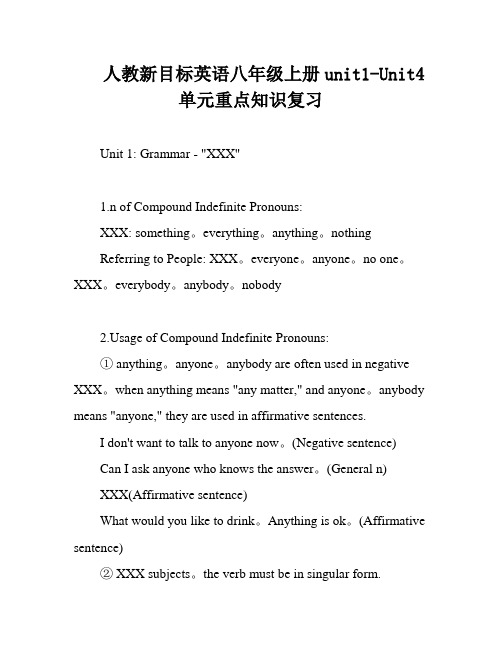
人教新目标英语八年级上册unit1-Unit4单元重点知识复习Unit 1: Grammar - "XXX"1.n of Compound Indefinite Pronouns:XXX: something。
everything。
anything。
nothingReferring to People: XXX。
everyone。
anyone。
no one。
XXX。
everybody。
anybody。
nobodyage of Compound Indefinite Pronouns:① anything。
anyone。
anybody are often used in negative XXX。
when anything means "any matter," and anyone。
anybody means "anyone," they are used in affirmative sentences.I don't want to talk to anyone now。
(Negative sentence)Can I ask anyone who knows the answer。
(General n)XXX(Affirmative sentence)What would you like to drink。
Anything is ok。
(Affirmative sentence)② XXX subjects。
the verb must be in singular form.Everyone here is from China.XXX.③ Adjectives XXX.Would you like to buy anything special?Can XXX interesting?④ When making requests。
译林版九年级英语unit1-unit4知识点总结大全
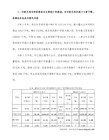
三、核心语法
• • • • • • • • • • • • • • • • • • • • • • A and,but,or和so的用法 【一语击破】 A.and的用法: and可以连接语法作用相同的词、短语或句子,表示并列或对称的关系,可翻译为“和”、“并”、“又”、“兼 ”等。 1)连接两个并列主语。如: Millie and Amy go to the park every week. Millie和Amy每周都去公园。 2)连接两个并列谓语。如: You must take care of yourself and keep healthy. 你必须照顾你自己并保持健康。 3)连接两个简单句。如: They love playing football and we love playing football, too.他们喜欢踢足球,我们也喜欢踢足球。 【友情提醒】 ①如果连接两个或两个以上的词语,通常把and放在最后一个词语前面;为了强调,可在两者之间分别加上and;把 词语连接起来时,通常把较短的词语放在前面。如: I like eggs, meat, rice, noodles and dumplings. 我喜欢鸡蛋、肉、米饭、面条和饺子。 ②但是有些用and连接的词语,顺序是固定的,不能随意改变。如: men,women and children男人、妇女和儿童 fish and chips炸鱼加炸土豆片 B.but的用法: but在英语中常用作连词。用来连接词与词、词组与词组或句子与句子、表示某种逻辑关系(并列、从属、转折、 因果等)。 一般而言,凡是用but连接的两个内容,其意义是相反的,如果不带有相反的意义,则不能用but,而要用and。如 : They are tired but happy.他们很累但挺高兴。 He is poor but honest. 他很穷但非常诚实。 I was going to write, but I lost your address.
人教PEP版英语六年级下册Unit 1-4知识点总结(期末复习)
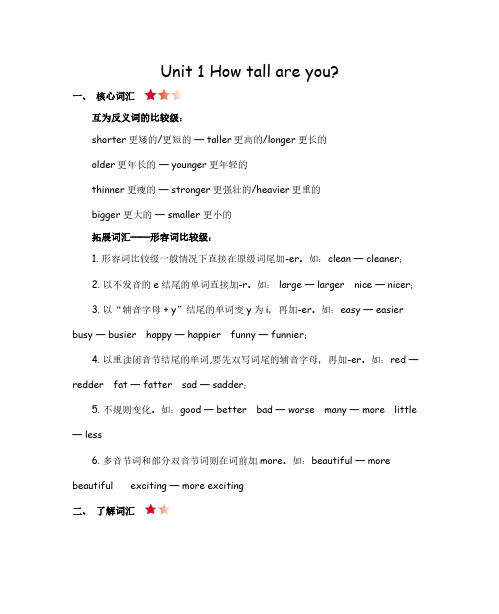
Unit1How tall are you?一、核心词汇互为反义词的比较级:shorter更矮的/更短的—taller更高的/longer更长的older更年长的—younger更年轻的thinner更瘦的—stronger更强壮的/heavier更重的bigger更大的—smaller更小的拓展词汇——形容词比较级:1.形容词比较级一般情况下直接在原级词尾加-er。
如:clean—cleaner;2.以不发音的e结尾的单词直接加-r。
如:large—larger nice—nicer;3.以“辅音字母+y”结尾的单词变y为i,再加-er。
如:easy—easier busy—busier happy—happier funny—funnier;4.以重读闭音节结尾的单词,要先双写词尾的辅音字母,再加-er。
如:red—redder fat—fatter sad—sadder;5.不规则变化。
如:good—better bad—worse many—more little —less6.多音节词和部分双音节词则在词前加more。
如:beautiful—more beautiful exciting—more exciting二、了解词汇dinosaur恐龙hall大厅metre米(美式英语:meter)than比both两个都kilogram千克;公斤countryside乡村lower(low的比较级)更低地shadow阴影;影子smarter(smart的比较级)更聪明的become开始变得;变成三、核心句型1.—How tall are you?你有多高?—I’m1.64metres.我身高1.64米。
2.—What size are your shoes,Mike?迈克,你穿多大号的鞋?—Size7.7号。
3.—How heavy are you?你体重多少?—I’m48kilograms.我体重48公斤。
人教版英语七年级下册Units1-4知识点总结
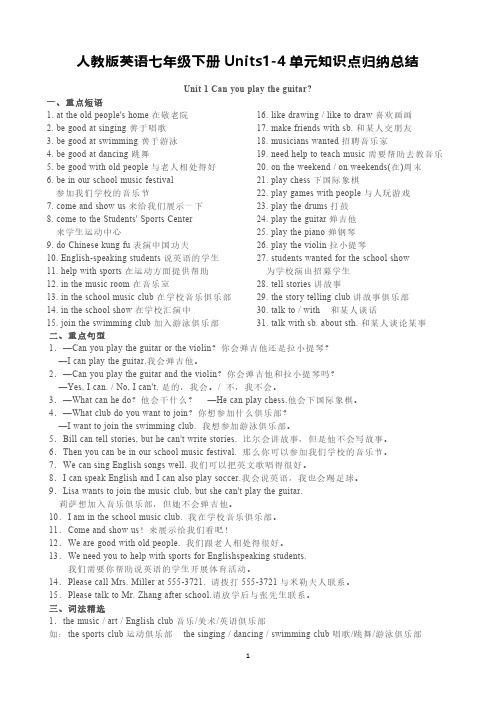
人教版英语七年级下册Units1-4单元知识点归纳总结Unit1Can you play the guitar?一、重点短语1.at the old people's home在敬老院2.be good at singing善于唱歌3.be good at swimming善于游泳4.be good at dancing跳舞5.be good with old people与老人相处得好6.be in our school music festival参加我们学校的音乐节e and show us来给我们展示一下e to the Students'Sports Center来学生运动中心9.do Chinese kung fu表演中国功夫10.English-speaking students说英语的学生11.help with sports在运动方面提供帮助12.in the music room在音乐室13.in the school music club在学校音乐俱乐部14.in the school show在学校汇演中15.join the swimming club加入游泳俱乐部16.like drawing/like to draw喜欢画画17.make friends with sb.和某人交朋友18.musicians wanted招聘音乐家19.need help to teach music需要帮助去教音乐20.on the weekend/on weekends(在)周末21.play chess下国际象棋22.play games with people与人玩游戏23.play the drums打鼓24.play the guitar弹吉他25.play the piano弹钢琴26.play the violin拉小提琴27.students wanted for the school show为学校演出招募学生28.tell stories讲故事29.the story telling club讲故事俱乐部30.talk to/with和某人谈话31.talk with sb.about sth.和某人谈论某事二、重点句型1.—Can you play the guitar or the violin?你会弹吉他还是拉小提琴?—I can play the guitar.我会弹吉他。
七年级上册Unit 1-Unit 4(中考复习)-人教版英语中考一轮复习题
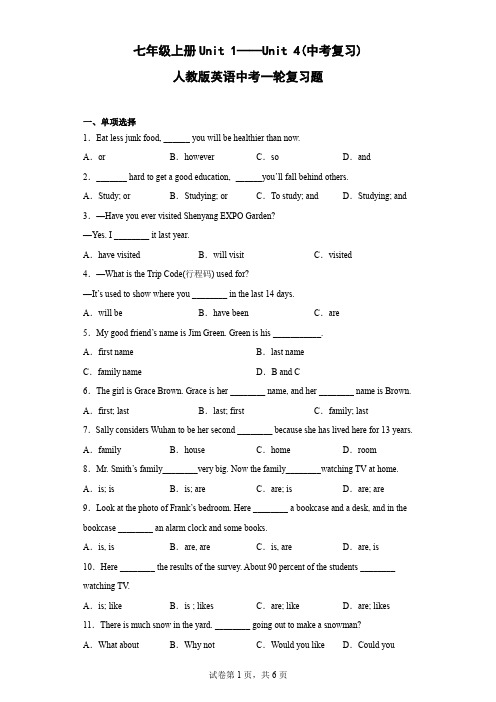
七年级上册Unit 1——Unit 4(中考复习)人教版英语中考一轮复习题一、单项选择1.Eat less junk food, ______ you will be healthier than now.A.or B.however C.so D.and2._______ hard to get a good education,______you’ll fall behind others.A.Study; or B.Studying; or C.To study; and D.Studying; and 3.—Have you ever visited Shenyang EXPO Garden?—Yes. I ________ it last year.A.have visited B.will visit C.visited4.—What is the Trip Code(行程码) used for?—It’s used to show where you ________ in the last 14 days.A.will be B.have been C.are5.My good friend’s name is Jim Green. Green is his ___________.A.first name B.last nameC.family name D.B and C6.The girl is Grace Brown. Grace is her ________ name, and her ________ name is Brown. A.first; last B.last; first C.family; last7.Sally considers Wuhan to be her second ________ because she has lived here for 13 years. A.family B.house C.home D.room 8.Mr. Smith’s family________very big. Now the family________watching TV at home. A.is; is B.is; are C.are; is D.are; are 9.Look at the photo of Frank’s bedroom. Here ________ a bookcase and a desk, and in the bookcase ________ an alarm clock and some books.A.is, is B.are, are C.is, are D.are, is 10.Here ________ the results of the survey. About 90 percent of the students ________ watching TV.A.is; like B.is ; likes C.are; like D.are; likes 11.There is much snow in the yard. ________ going out to make a snowman?A.What about B.Why not C.Would you like D.Could youplease12.— Shall we go to Nanjing Green Expo Park to enjoy the beautiful flowers this afternoon?— ________. Let’s go there by bike.A.I think so B.That’s all right C.My pleasure D.Sounds great 13.People now in China ________ to divide rubbish into different groups.A.asked B.were asking C.are asking D.are asked 14.My teachers often ask us ________ our opinions in the class bravely.A.share B.to share C.sharing D.shared 15.There __________ two people waiting for you outside now.A.is B.are C.was D.were 16.Fresh water ________ more important than anything else.A.is B.are C.was17.Mike’s aunt is ________ English teacher. We all like ________.A.our; she B.our; her C.we; she D.we; her 18.Ann has got a letter from ________ best friend. It makes her quite excited.A.she B.her C.hers D.herself 19.The way to work he is used to is so different from ________ that we can’t work well with each other.A.me B.myself C.I D.mine 20.—Is this red e-bike _______, Mike?—Of course not. Red is not my taste. _______ e-bike is black.A.your; Your B.my; Your C.yours; My D.yours; Mine 21.The gravity on Mars is only about there eighths of ________ on the Earth.A.that B.those C.one D.ones 22.— Who’s that boy over there?—______ is my cousin.A.You B.I C.He D.She23.— Where’s the People’s Park?— Go along Gongyuan Road, turn right at the second crossing and it’s _________ your left. A.on B.to C.at D.in 24.—Taiwan lies ________ the southeast of China, and it is ________ the east of Fujian.—OK, I want to visit it some day.A.in; to B.on; to C.to; in D.to; on 25.—Is the sweater Jack's?—Yes, and the T-shirt is _______, too.A.yours B.hers C.his D.mine26.We play volleyball _______ school _______ our close friends.A.for; to B.at; with C.in; for D.on; with 27.—_______ this ruler Jack's?—No, Jack _______ a blue ruler.A.Is; has B.Does; has C.Is; doesn't have D.Does; doesn't have28.My sister and I like eating two _______ and some _______ for dinner. They are really delicious.A.salad; eggs B.salads; eggs C.salad; eggs D.salads; egg 29.—The soccer game is great. _______?—Sounds good.A.How's it?B.What's in it?C.Who is in the game?D.How about watching it二、完形填空Carol and Susan are very good friends. They are in the same ____30____ at school and they often visit ____31____ home at weekends. Now they are ____32____ eight years old. Carol’s mother has got a new baby. Carol is very ____33____ to have a little sister. So she is always talking about her to Susan. At first Susan is very ____34____ in the new baby because she doesn’t have any brother or sister. But ____35____ some time she begins to get tired of Carol’s endless talking about it. She also feels a little jealous(嫉妒) of her friend.One morning when the two girls ____36____ on the school ground, Carol says to Susan, “Do you ____37____, Sue, my baby sister has put on(增重) nearly half a pound in weight this week.” “That is not very ____38____.” answers Susan. “I know a baby and he puts on ten pounds a day.” “Oh, that can’t be ____39____.” answers Carol laughingly. “Whose baby is it?” “An elephant’s.” says Susan.30.A.home B.table C.class D.group 31.A.each other’s B.their C.theirs D.each other33.A.angry B.sorry C.surprised D.glad 34.A.interesting B.interested C.happy D.sad 35.A.before B.for C.after D.at 36.A.played B.meet C.weight D.walked 37.A.hear B.think C.find D.know 38.A.much B.many C.few D.little 39.A.impossible B.wrong C.true D.sure三、阅读单选Dear Betty,I’m very happy to get your letter from London. I think I can be your first foreign friend.My name is Yu Yan. My English name is Helen. I’m twelve. I am a student in No. 1 Middle school in Nanjing. I am in Class Three, Grade Seven. I am good at music. I can dance well. At school, my favorite subject is English. Miss White, our English teacher, is from America. She’s good to us.I have many friends in my school. Kim is an English girl. She is good at playing tennis. May always wears a yellow skirt. She is a beautiful girl. She is good at math. She always helps me with my math. Sally can speak Chinese, French and English. She is also good at swimming. Wendy is new here. She is from Beijing. She speaks English well.Please send me a picture of your class and tell me something about your friends.Yours,Helen 40.Where is Betty?A.In America.B.In England.C.In China.D.In Canada. 41.What subject does Miss White teach?A.English.B.Computer.C.Chinese.D.Math. 42.Who can swim well?A.Kim.B.Sally.C.May.D.Wendy 43.How many friends does Helen have in her school?A.Two.B.Three.C.Four.D.Five. 44.Which statement is TRUE?A.Kim is from Beijing.B.Wendy plays tennis well.C.Helen is a 13-year-old girl.D.May likes to wear a yellow skirt.We have been used to wearing masks(口罩)in public since February 2020. About 300 million masks are used and then thrown away every day in China. Where do these masks go? You might think they just go into a rubbish bin. But that’s just the first stop on the masks journey.After the masks are thrown into rubbish bins, rubbish trucks take the rubbish to collection areas. Next, the masks will be burned. Won’t burning masks cause pollution? The answer is no. According to scientists, it doesn’t produce harmful things.In fact, the main material of most masks is polypropylene(聚丙烯). After burning, it changes into water and CO2. The process(过程)of burning the rubbish can produce electricity. Burning one ton of rubbish can produce more than 400 kilowatt hours(度)of electricity. There will be 162, 000 tons of used masks in China this year. Burning all of them can produce more than 64 million kilowatt hours of electricity. This is enough to make an electric car drive about 370 million km.At last, the waste from burning masks can be recycled to make bricks(砖块)or fill the roads.45.How many masks are used and then thrown away every day in China?A.About 64 million.B.About 300 million.C.About 370 million.D.More than 400 million.46.The first stop on the used masks’ journey is ________.A.electricity factories B.rubbish trucks C.rubbish bins D.mask factories 47.Which of the following is TRUE according to the passage ?A.Burning used masks is environmentally friendly.B.Many people disagree with wearing masks in public.C.The process of burning the masks can produce bricks.D.There are 162, 000 tons of used masks every month in China.48.What is the best title of the passage?A.How do we burn used masks?B.How do people produce electricity? C.Where do the used masks go?D.Why do we throw away used masks?四、用所给单词的正确形式填空49.Thanks to ________(electric), we can use the electric machine freely.50.Help _______________ to some fish, boys and girls. (you)51.She is my best friend and the best ________(help)at my studying.五、完成句子52.对那些帮助过我的人,我心存感激。
牛津译林版九年级上册英语期末复习Unit 1-Unit4知识点讲解
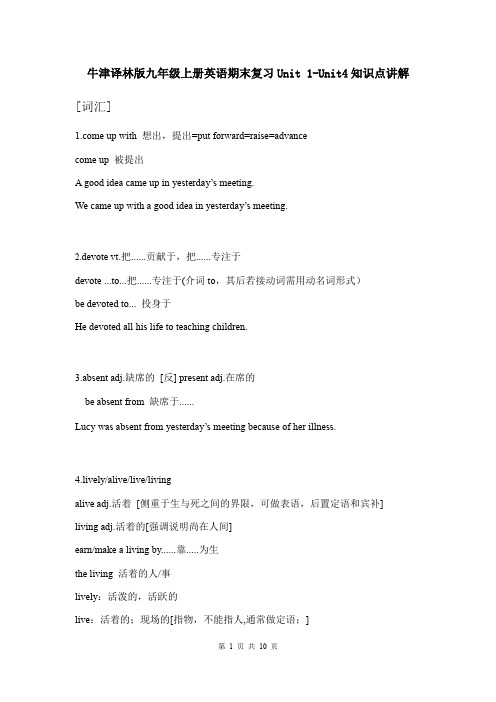
牛津译林版九年级上册英语期末复习Unit 1-Unit4知识点讲解[词汇]e up with 想出,提出=put forward=raise=advancecome up 被提出A good idea came up in yesterday’s meeting.We came up with a good idea in yesterday’s meeting.2.devote vt.把......贡献于,把......专注于devote ...to...把......专注于(介词to,其后若接动词需用动名词形式)be devoted to... 投身于He devoted all his life to teaching children.3.absent adj.缺席的[反] present adj.在席的be absent from 缺席于......Lucy was absent from yesterday’s meeting because of her illness.4.lively/alive/live/livingalive adj.活着[侧重于生与死之间的界限,可做表语,后置定语和宾补] living adj.活着的[强调说明尚在人间]earn/make a living by......靠.....为生the living 活着的人/事lively:活泼的,活跃的live:活着的;现场的[指物,不能指人,通常做定语;]He is still alive.He makes a living by making furniture.My English teacher is humorous,and he often makes his class lively. This is a live fish.5.prefer v.宁愿选择;更喜欢prefer A 更喜欢Aprefer A to B 喜欢A更胜于Bprefer doing to doing 喜欢做某事(前者)更胜于做某事(后者)prefer to do rather than do sth 宁愿做某事(前者)也不做某事(后者)=would rather do than do/would do rather than do 宁愿做某事也不做某事prefer doing 更喜欢做某事prefer to do 宁愿做某事6.suggest vt.建议;表明suggestion n.建议[C]suggest sth 建议/表明......suggest doing sth 建议做某事suggest one’s doing sth 建议某人做某事suggest sth to sb 向某人建议某事。
苏版英语初一下册unit1-unit4重点字词句
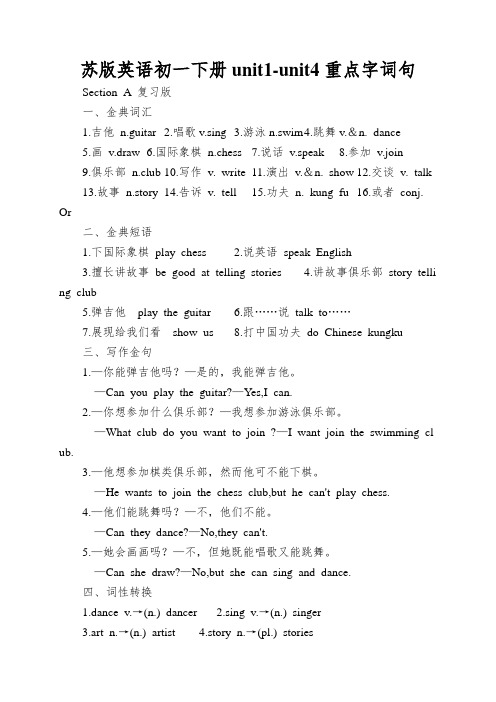
苏版英语初一下册unit1-unit4重点字词句Section A 复习版一、金典词汇1.吉他n.guitar2.唱歌v.sing3.游泳n.swim4.跳舞v.&n. dance5.画v.draw6.国际象棋n.chess7.说话v.speak8.参加v.join9.俱乐部n.club 10.写作v. write 11.演出v.&n. show 12.交谈v. talk13.故事n.story 14.告诉v. tell 15.功夫n. kung fu 16.或者conj. Or二、金典短语1.下国际象棋play chess2.说英语speak English3.擅长讲故事be good at telling stories4.讲故事俱乐部story telli ng club5.弹吉他play the guitar6.跟……说talk to……7.展现给我们看show us 8.打中国功夫do Chinese kungku三、写作金句1.—你能弹吉他吗?—是的,我能弹吉他。
—Can you play the guitar?—Yes,I can.2.—你想参加什么俱乐部?—我想参加游泳俱乐部。
—What club do you want to join ?—I want join the swimming cl ub.3.—他想参加棋类俱乐部,然而他可不能下棋。
—He wants to join the chess club,but he can't play chess.4.—他们能跳舞吗?—不,他们不能。
—Can they dance?—No,they can't.5.—她会画画吗?—不,但她既能唱歌又能跳舞。
—Can she draw?—No,but she can sing and dance.四、词性转换1.dance v.→(n.) dancer2.sing v.→(n.) singer3.art n.→(n.) artist4.story n.→(pl.) stories5.swim v.→(n.) swimmer6.write v.→(n.) writer7.talk v.→(adj.) talkative 8.guitar n.→(n.)guitaristSection B 复习版一、金典词汇1.鼓n. drum2.钢琴n.piano3.小提琴n. violin4.今天adv. To day5.中心n. center6.周末n. weekend7.教v .teach8.音乐家n. muisc ian9.人们n. people 10.而且adv. also 11.家n. home二、金典短语1.结交朋友make friends2.在周末on the weekend3.在某方面关心help (sb.) with sth.4.善于应对be good with5. 教音乐teach music6.打鼓play the drums7.拉小提琴play the violin 8.弹钢琴play the piano9.对……有方法be good with ……10.参加be in11.学校音乐节school music festival 12.说英语的学生Engish—spe aking students13.学生体育中心Students' Sports Center三、写作金句1.我喜爱和人们交谈、玩游戏I like to talk and play games with people.2.他们会给你讲故事,你又能够交朋友。
八年级上册英语知识点汇总Unit 1-4

Unit1 Past and present一. Comic strip&Welcome to the unit短语及固定搭配:1.share sb with sth 与某人分享某物补充:share in sth 共同承担,分担2.be kind to 对……友好ed to do sth 过去常常做某事,曾经做某事二. Reading短语及固定搭配:1.know sth well 对……非常了解2.since I was born 自我出生以来3.move house 搬家4.in the northern part of town=in the north of town 在镇的北面5.since then 自那时起6.over the years 在这些年期间7. in the town centre 在镇中心8. part of ……的一部分9.put the waste into the river 把废水排入河中10.in some wa ys在某种程度上11.most of 大多数12.move awa y 搬走13.as often as before 像从前一样经常14.from time to time = sometimes 不时,有时,偶尔15.turn …… into……把……变成……补充:……turn into…… ……变成……16.get married 结婚get married to sb与某人结婚marr y sb嫁给某人,娶某人be married (状态)已婚的17.take action to do sth 采取行动做某事三. Grammar现在完成时1.构成:have/has +V-ed2.基本句式肯定句:have /has + V-ed否定句:haven't /hasn't +V-ed一般疑问句及答句:--Have/has ……+V-ed--Yes……have/hasNo……haven't/ha sn't3.用法:表示从过去持续到现在的动作或状态或已完成但对现在有一定影响的动作4.常用的时间表达语:already 已经yet 还未(一般用于否定句)ever 曾经(一般用于疑问句)never 从不J ust 刚才recently 最近(句末)since 自……以来(+一段时间ago 或时间点)for(+一段时间) before 以前(句末)5.过去分词变化①与动词原形相同如come→came→come②与动词过去式相同如get→got→got③在动词原形后面+en 如eat→ate→eaten④在以e结尾的动词原形后面+n如drive→drove→driven⑤在动词过去式后面+n 如break→broke →broken⑥一些特殊的变化举例略参见书本P122-123四. Integrated skills短语及固定搭配:1.local people 本地人2.go abroad 出国e back = return 返回4.keep in touch 保持联系5.borrow from sb 借进来lend to sb 借出去6.hope(that)+从句希望……hope to do sth希望做某事7.keep in touch with sb 与某人保持联系补充:lose in touch with sb 与某人失去联系municate with sb = have communication with sb与某人交谈句子:1.The Internet makes communication mu ch easier 网络使交流简单得多2.Starlight Town ha s changed a lot/greatly over the years=Amazing/great changes have taken place in Starlight Town over the years星光镇这些年变化巨大五. study skills事实和观点:Facts (事实):是对事物的客观陈述,不掺杂任何人的主观感情,意识Opinions(观点):观点是从人的一定立场或角度出发,对事物、事件的看法观点不一定属实:阅读时,要根据不同的文体,用不同的方法分清事实和观点;写作时,我们要学会运用事实来制成自己的观点,使我们的观点更有说服力短语及固定搭配:1.be/get used to doing sth 习惯于做某事2.on one's own = alone = by oneself 亲自3.spend time on 在……花时间六. Task短语及固定搭配:1.listen to the radio 听收音机2.enjoy a comfor table life 过着舒适的生活3.make sb do sth 使某人做某事补充:make sb /sth+名词e.g. We made J ack our monitor 我们选举jack当班长句子:1.Now the streets are wide and clean with man y green trees on both sides现在街道又宽又干净,两处绿树掩映2.Many fa milies even has their own cars 许多家庭甚至有了私家车Unit2 Travelling一. Comic strip &Welcome to the Unit短语及固定搭配:1.get all my things 带上我所有的东西2.so excited 如此的激动3.places of interest 名胜4.the capital of ……的首都5.go to ……for holida y 去……度假6.be/get ready to do sth 准备好做某事be/get ready for sth 准备好某事7.have been to 去过某地(已回)have gone to 去了某地(未回)have been in 去某地(在该地)句子:I don't think it'll be a holiday for me 我认为这对我而言不是一个假期补充:常见的否定前置词:think,believe等二. Reading短语及固定搭配:1.haven't seen each other 没有见到彼此2.have been in Hong Kong for two days在香港两天3.have a fantastic time 度过一段美妙的时光=have fun 玩得开心=have a good/great /nice /wonderful time 过得愉快=enjoy oneself 玩得开心,过得愉快4.roller coaster 过山车5.move at high(/top/full)speed 高速运动补充:at low speed 低速6.through the ride 在乘坐的过程中7.have a quick meal 吃一份简餐8.on the way 在路上on the way to 在……的路上补充:与way有关的短语1.in some wa ys(同步练习上介绍的是:in a way)在某种程度上2.by the wa y 顺便问一下3.in one's wa y 挡住某人的去路4.lost one's wa y 迷路5.all the wa y 一路上,沿路6.one the way 在路上,即将发生7.make one's wa y 某人动身(去某处),前进8.find one's wa y 找到路,找到解决方法9.such as 例如(一般后面跟多个例子)10.get excited 兴奋起来11. a parade of ……的游行ter in the afternoon= in the later afternoon 傍晚13.the best part of the day一天中最好的部分14.take photos 拍照15.a 4-D film 一场4D电影16.do some shopping 购物17.a couple of 一对,几个18.let me have a look 让我看看19.at the speed of 以……的速度20.hurry to do sth 赶着做某事22.can't stop doing sth 忍不住做某事,情不自禁做某事23.take photos of 拍……的照片24.be like 像(可指外貌或者品质)look like 像(单指外貌)25.buy sb sthbuy sth for sb26.in front of 在……(外部的)前面in the front of 在……(内部的)前面27.at the end of 在……的末尾in the end(=finally=at las t) 最后by the end of(通常加时间词)到……为止三. Grammarhave/has been 与have/has gone 的区别have/has been表示某人曾经去过某地,并且已经回来了e.g. He has been to the Great Wall twice 他曾经去过长城两次have/has gone 表示某人已经去了某地,但还没回来e.g. He has gone to the cinema 他去看电影了for 和since 的用法for+时间段e.g. He has been awa y fro m China for two years他离开中国已有两年了since+时间点/时间段+agoe.g. He has lived in Nanjing since 2010 自2010以来,他一直住在南京补充:since+从句e.g. Great changes have taken place since you left自从你离开,就发生了很大的变化It is +一段时间+since+从句e.g. It is years s ince I graduated from University自从我大学毕业以来已经有两年了带时间状语的现在完成时的句子中,谓语动词中短暂性动词需转换为延续性动词四. Integrated Skills短语及固定搭配:1.in any season 在任何季节2.all yea round 全年,一年到头3.love water sports 热爱水上运动4.go there in any season except winter 除了冬天的任何一个季节去那5.on cold and Snowy da ys 在寒冷的下雪天6.on busines s 出差7.take a direct flight to Cheng Du 直飞成都句子:1.The best time g o there is in spring or autumn 去那的最好时间是春天或秋天2.Do you have any plans for the May Da y holida ys 五一假期有什么打算3.Howlong does it take to fly to Cheng Du 乘飞机到成都要多久五. Study skills主旨和细节主旨(main points)是作者思想和写作意图在文中的集中体现,起着统率和支配全文的作用。
新译林版英语四年级下册Unit1-Unit4期中知识点和语法点复习

新译林版英语四年级下册U n i t1-U n i t4期中知识点和语法点复习(共6页)--本页仅作为文档封面,使用时请直接删除即可----内页可以根据需求调整合适字体及大小--Review & Check Unit1-Unit4Unit1-Unit4课文重点内容详解:1. —What subjects do you like?—I like English and Maths.—Me too.1) “What subjects do you like?”意思是:你喜欢什么科目?这个时候,subject后面一般会加上“-s”。
如果询问“你喜欢哪门课?”,这时候我们可以用”Which subject do you like?”来表示。
2) “Me too”是”我也是“意思。
2. —Oh! It’s time for PE.—Let’s go to the playground.1) 表示“该是……的时候了。
/……的时候到了。
”我们可以用以下两种句型来表达:It’s time for sth. = It’s time to do sth.eg.: It’s time for breakfast. = It’s time to have brea kfast.2) Let’s = Let us 让我们拓展:在操场上:in the playground [英],on the playground [美]3. What lessons do we have this morning?1) lesson的意思是“课、课程”。
2) “今天早上、下午和晚上”用“this morning/ afternoon/ evening”来表示,且此时在“this”前不需要加上介词。
3) “have”的三单形式是:has 。
4. I like PE. It’s fun.1) PE是“physics education”的首字母缩写。
六年级上册英语1—4知识点复习全面版

10. There ________(be) some water in the bottle. 11. Mike _______(like) cooking. 12. They _______(have) the same hobby. 13. My aunt _______(look) after her baby carefully. 14. You always _______(do) your homework well. 15. I _______(be) ill. I’m staying in bed. 16. She _______(go) to school from Monday to Friday. 17. Liu Tao _______(do) not like PE. 18. The child often _______(watch) TV in the evening. 19. Su Hai and Su Yang _______(have) eight lessons this term. 20. -What day _______(be) it today? - It’s Saturday.
B: I like collecting stamps. 2. 第三人称单数作主语:He / She + 动词的第三人称单数形 式(does)。例:
He likes collecting stamps, too. 3. Does 引导的一般疑问句,用来确定自己对事情的判断:--Does he / she + 动词原形?--- Yes, he / she does. No, he / she doesn't. 例:
Unit 2 Where Is the Science Museum?
人教新目标英语八年级上册unit1-Unit4单元重点知识复习
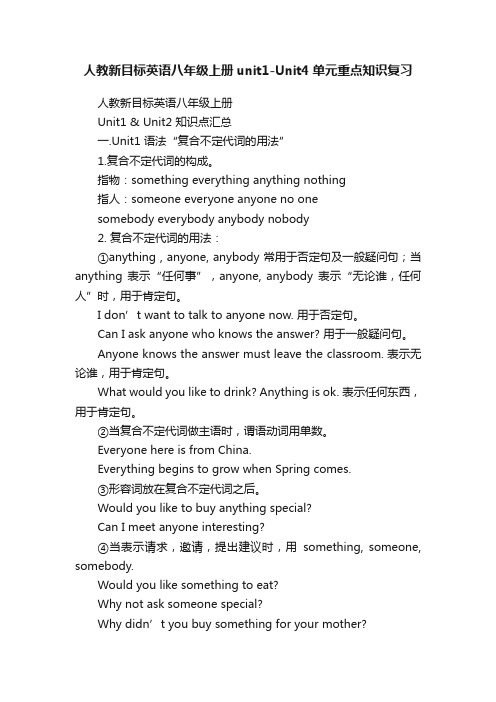
人教新目标英语八年级上册unit1-Unit4单元重点知识复习人教新目标英语八年级上册Unit1 & Unit2 知识点汇总一.Unit1 语法“复合不定代词的用法”1.复合不定代词的构成。
指物:something everything anything nothing指人:someone everyone anyone no onesomebody everybody anybody nobody2. 复合不定代词的用法:①anything , anyone, anybody 常用于否定句及一般疑问句;当anything 表示“任何事”,anyone, anybody 表示“无论谁,任何人”时,用于肯定句。
I don’t want to talk to anyone now. 用于否定句。
Can I ask anyone who knows the answer? 用于一般疑问句。
Anyone knows the answer must leave the classroom. 表示无论谁,用于肯定句。
What would you like to drink? Anything is ok. 表示任何东西,用于肯定句。
②当复合不定代词做主语时,谓语动词用单数。
Everyone here is from China.Everything begins to grow when Spring comes.③形容词放在复合不定代词之后。
Would you like to buy anything special?Can I meet anyone interesting?④当表示请求,邀请,提出建议时,用something, someone, somebody.Would you like something to eat?Why not ask someone special?Why didn’t you buy something for your mother?Unit2 语法“频率副词”How often 常用于对频率的提问,意为“多长时间一次”,其答语可以是once/ twice / three times a week; always/ usually/ often/ sometimes/ hardly ever/ never 等表示时间频率的副词及短语。
Unit 1-Uni4 复习要点
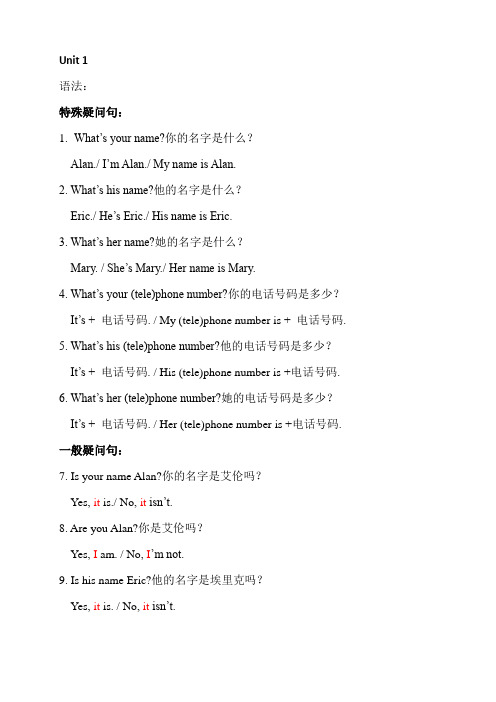
Unit 1语法:特殊疑问句:1.What’s your name?你的名字是什么?Alan./ I’m Alan./ My name is Alan.2. What’s his name?他的名字是什么?Eric./ He’s Eric./ His name is Eric.3. What’s her name?她的名字是什么?Mary. / She’s Mary./ Her name is Mary.4. What’s your (tele)phone number?你的电话号码是多少?It’s + 电话号码. / My (tele)phone number is + 电话号码.5. What’s his (tele)phone number?他的电话号码是多少?It’s + 电话号码. / His (tele)phone number is +电话号码.6. What’s her (tele)phone number?她的电话号码是多少?It’s + 电话号码. / Her (tele)phone number is +电话号码. 一般疑问句:7. Is your name Alan?你的名字是艾伦吗?Yes, it is./ No, it isn’t.8. Are you Alan?你是艾伦吗?Yes, I am. / No, I’m not.9. Is his name Eric?他的名字是埃里克吗?Yes, it is. / No, it isn’t.10. Is he Eric?他是埃里克吗?Yes, he is./ No, he isn’t.11. Is her name Mary?她的名字是玛丽吗?Yes, it is. / No, it isn’t.12. Is she Mary?她是玛丽吗?Yes, she is. / No, she isn’t.重点句子:1.Nice to meet you.见到你很高兴。
Unit1-Unit4词汇练习总复习牛津深圳版八年级英语下册

复习题Unit1 - Unit4Unit 1第一题同义替换。
从下面每小题的A、B、C三个选项中选出可以替换划线部分的最佳选项。
( )1.We should try our best to help the disabled children.A. the children who are able to walk and move easilyB. the children who are different from othersC. the children who are not able to walk or move easily ( )2. After his wife died, he lived alone. A. unhappy B. by himself C. lonely( )3.He raised his hand to ask a question. A. put up B. kept in C. rose( )4.Tim fell off the bike and hurt his leg. A. injured B. made C. expressed( )5.You must ask for the teacher’s permission if you want to leave early. A. disagreement B. questions C. agreement( )6. Sara shouted with joy when she won the first prize. A. happiness B. illness C. surprise( )7.Many western countries raise a large number of beef cattle. A. put up B. move C. keep( )8.You only need to pay for breakfast and dinner. A. spend money on B. cost C. take up( )9. Everything is in peace after the sunset. A. noisy B. quiet C. not worried( )10.After winning the game, everyone is in high spirits. A. has good ability B. is in high position C. has good feelings ( )11. The old woman is ill these days. A. worried B. in good health C. in bad health ( )12.Our village is holding a meeting to raise money for building the new hall. A.create B. steal C. collect( )13. Could you give me a hand? The boxes are too heavy. A. teach me B. visit me C. help me( )14. What I want is to have some peace with my grandchildren. A. quiet time B.happy moment C.exciting time( )15. We should always help those who are in need. A. are dangerous B.need help C.need money( )16. Jim tried his best to raise his spirits though he failed the exam. A. cheer himself up B.make himself calm C.keep himself down ( )17.We should help children who have difficulty in walking or moving. A..have trouble in B.are different from C.have problems to ( )18.I was invited to attend the meeting but I didn’t make it. A. join B.take part in C.see( )19.We should do something to raise some money for the poor families. A. collect B. choose C. make( )20. The teenager under the tree is in this middle school. A. young person aged from 13 to 19 B. middle-aged person C. child from 6 to 10 ( )21. The mistake you've made is serious, so we must find a way to solve it quickly.A. bad and dangerous B. good and useful C. bad but helpful ( )22. Students should learn how to express their feelings. A. respect B. introduce C. show( )23. Helping others can bring you joy because you make others ' life better. A. excitement B. happiness C. success( )24. I have difficulty understanding this passage. Could you explain it to me? A. fun B. time C. trouble( )25. It's difficult to understand his pain unless we experience it by ourselves. A. suffering B. anger C. fear( )26. He offered me a ride to school. but I refused. A. waited B. gave C. agreed第二题单选填空。
units1-4复习
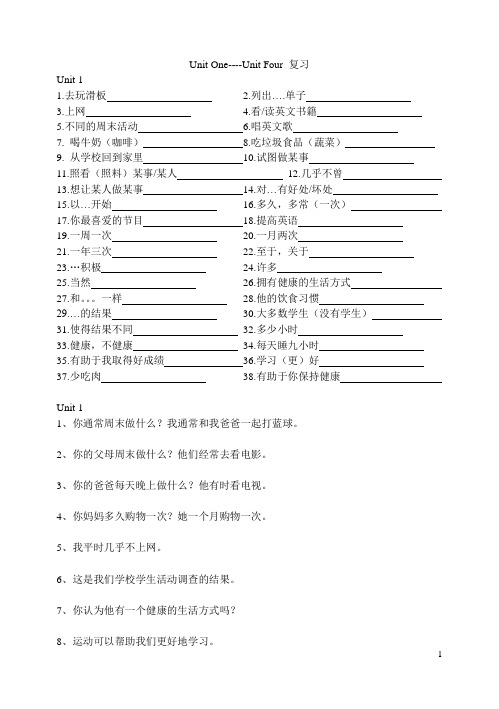
Unit One----Unit Four 复习Unit 11.去玩滑板2.列出….单子3.上网4.看/读英文书籍5.不同的周末活动6.唱英文歌7. 喝牛奶(咖啡)8.吃垃圾食品(蔬菜)9. 从学校回到家里10.试图做某事11.照看(照料)某事/某人12.几乎不曾13.想让某人做某事14.对…有好处/坏处15.以…开始16.多久,多常(一次)17.你最喜爱的节目18.提高英语19.一周一次20.一月两次21.一年三次22.至于,关于23.…积极24.许多25.当然26.拥有健康的生活方式27.和。
一样28.他的饮食习惯29.…的结果30.大多数学生(没有学生)31.使得结果不同32.多少小时33.健康,不健康34.每天睡九小时35.有助于我取得好成绩36.学习(更)好37.少吃肉38.有助于你保持健康Unit 11、你通常周末做什么?我通常和我爸爸一起打蓝球。
____________________________________________________________________ 2、你的父母周末做什么?他们经常去看电影。
____________________________________________________________________ 3、你的爸爸每天晚上做什么?他有时看电视。
____________________________________________________________________ 4、你妈妈多久购物一次?她一个月购物一次。
____________________________________________________________________ 5、我平时几乎不上网。
_____________________________________________________________________ 6、这是我们学校学生活动调查的结果。
- 1、下载文档前请自行甄别文档内容的完整性,平台不提供额外的编辑、内容补充、找答案等附加服务。
- 2、"仅部分预览"的文档,不可在线预览部分如存在完整性等问题,可反馈申请退款(可完整预览的文档不适用该条件!)。
- 3、如文档侵犯您的权益,请联系客服反馈,我们会尽快为您处理(人工客服工作时间:9:00-18:30)。
Unit1-unit4复习一、重点词汇
《1》
1. first name= given name 名字
2. last name= family name 姓
3. telephone number= phone number 电话号码
《2》
1. Excuse me. 打扰了。
2.family tree 家谱
3. a photo of my family =my family photo一张全家福
4. Picture One 第一幅图
5. in Class 6, Grade 7 在七年级六班
6.in the first photo 在第一幅照片中
7. in the next picture在下一幅照片中
《3》
1.Excus me.打搅
2.his blue pen. 他的蓝色钢笔
3.thank you=thanks ( for +名词)谢谢(因…而感谢)
4.You’re welcome.=That’s all right. 不用谢。
5.in the school library.在学校图书馆。
6.ask+人+for+物向某人要某东西。
7.some keys 一些钥匙。
8.e-mail +人(at+网址)给某人发邮件。
9.call+sb人( at+号码)
10. a set of keys 一窜钥匙
11. computer game电脑游戏
《4》
1.on the /yoursofa. 在沙发上。
2.in the/my schoolbag.在书包里。
3.under the/his chair 在椅子下。
e on 加油,快点
5.on your head. 在你的头上。
6.tape player 录音机
7.model plane.飞机模型。
8.in our room. 在我们的房间里。
二、易错点
1/、形容词性的物主代词:my your her his its our their 形容词性的物主代词必须用在名词前,且前不能用a/an/the/this/that/these/those 修饰。
名词性的物主代词:mine yours hers his its ours theirs
名词性的物主代词 =形容词性的物主代词 + 名词
所以名词性的物主代词后不能接名词
1. The pen is _____. ( he )
2. Where is ______ ( you )pen?
3 This is my pen.=This pen is ____.
4. Are those your pens?= Are those--------
2、
名词:名词单数变复数时,前面的a/an要除掉。
反之,变单数时,要加上a/an.
He’s a boy. -------
They’re English books. -------
3、
Here、there、everywhere 前不用介词
4、
名词所有格的变法
( 1 )一般在名词后加’s.如:Tom’s
( 2 )以s结尾单词加’ . Parents’ room。
